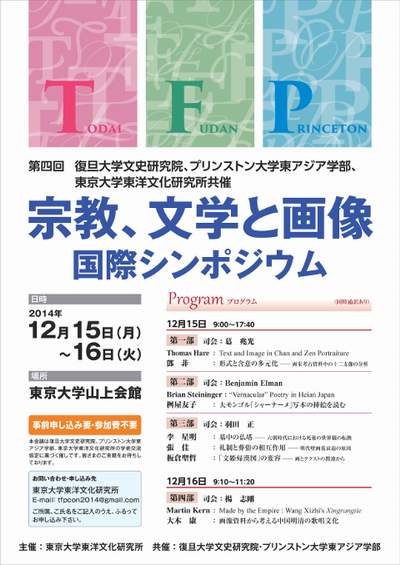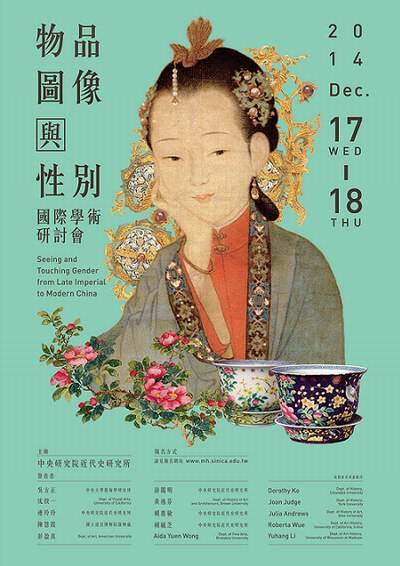日本、马来西亚近期汉学会议信息(十九)
7、【演講】米建國:What Is Knowledge? Virtue Epistemology and Chinese Philosophy
時 間:2014年12月13日(週六)18:00-20:00
主 講 人:米建國(東吳大學哲學系副教授)
地 點:東京大学駒場キャンパス14号館710号室(東京都目黒区駒場3−8−1)
主辦單位:詳下
連結網址:http://utcp.c.u-tokyo.ac.jp/events/2014/12/related_event_the_51th_meeting/
內容簡介:
子曰:「由!誨女知之乎?知之為知之,不知為不知,是知也。」
The Master said, “You, shall I teach you what knowledge is? When you know a thing, to hold that you know it; and when you do not know a thing, to allow that you do not know it – this is knowledge.” (The Analects of Confucius, “Wei Zheng”: 17.)
“Apt belief, animal knowledge, is better than belief that succeeds in its aim, being true, without being apt. Apt belief aptly noted, reflective knowledge, is better than mere apt belief or animal knowledge, especially when the reflective knowledge helps to guide the first order belief so that it is apt. In such a case the belief is fully apt, and the subject knows full well.” (Ernest Sosa, Knowing Full Well: 12-13.)
In this paper I examine the role that reflection plays in knowledge. I argue that a notion of reflection grounded in ancient Chinese philosophy can help us understand second-order knowledge or reflective knowledge in both the accounts of Confucius and Ernest Sosa. I also argue that reflection can help us understand the most ideal kind of knowledge. I begin my paper by laying out Confucius’s and Sosa’s accounts of knowledge, while at the same time drawing the reader’s attention to their common concern with reflective knowledge. Next I draw on an account of reflection from Confucius and elaborate on it. With this account of reflection in hand, I return to Confucius’s and Sosa’s accounts of knowledge and show how this account of reflection can help those accounts of knowledge.
The 51th meeting of Tokyo Colloquium of Cognitive Philosophy:
Co-organized by the Department of History and Philosophy of Science at the University of Tokyo and The Study Group for Philosophy of Action
8、【演講】董新林:遼上京と祖陵(遼太祖・耶律阿保機陵墓)の考古新発見
時 間:2014年12月18日(週四)15:00-18:00
主 講 人:董新林(中國社会科学院考古研究所教授)
地 點:日本中央大学多摩キャンパス2号館4階研究所会議室2(東京都八王子市東中野742-1)
主辦單位:日本中央大学人文科学研究所の研究チーム「ユーラシア・アフリカ大陸における都市 と宗教の比較史的研究」
連結網址:http://ztw.seesaa.net/
內容簡介:
講演要旨:遼(916-1125)は、東北アジアの遊牧狩猟地域出身の契丹人が中国大陸北部の農業地域を征服して建国した農牧複合の国家である。ユーラシア大陸東部の歴史をふりかえる時、遼は、遊牧・農業両地域を統治する体系的な行政制度を創造した点において、歴史の画期をなす国家となる。近年の遼研究を国際的に主導する董教授は、今回の講演において、自ら発掘を指導した遼の都城・上京と遼の太祖・耶律阿保機(872-926)陵墓の考古新発見をもとに、都城と王陵の関連を新たに分析する。
講演言語:中国語(通訳あり)
9、【演講】小野寺史郎:清末民初のミリタリズムとその課題
時 間:2015年1月31日(週六)15:00-17:00
主 講 人:小野寺史郎(埼玉大学教養学部准教授)
地 點:東京大學本郷キャンパス,法文1号館1階115番教室
主辦單位:中国社会文化学会
連結網址:http://www.asnet.u-tokyo.ac.jp/?q=node/7735
內容簡介:
【中国社会文化学会2014年度第2回例会】
清末に「尚武」や「軍国民主義」といった思潮が中国知識人の間で一種のブームとなったことについては、早くから指摘がなされてきた。特に近年はこれらの潮流について、体育教育の普及やその近代的な「男性性」構築との関係という視点から分析する研究が増えている。ただ、梁啓超や蔡鍔などの文章の中では、実際に身体を鍛えることと並んで、より広い「武を尚ぶ」文化や習慣、価値観を中国社会に作り上げるということが強調されている。
本報告は、近年の先行研究を参照しつつ、これらの議論の内容を再検討することで、近代中国の「尚武」や「軍国民主義」が当初から、個人主義的な英雄と規律ある軍隊の一員、暴力の行使と自己抑制、野蛮と文明、といった一連の分裂を含みこんでいたこと、それが当時の時代状況や社会情勢と合わせて、清政府・民国政府が実際に軍国民教育を政策として導入する際に一つの桎梏となった可能性について論じる。 主持人:村田雄二郎(東京大學教授)
※本演講收取參加費,詳請請參見官網
10、宗教、文学、図像国际シンポジウム
时 间:2014年12月15至16日(周一至周二)
地 点:东京大学山上会馆(东京都文京区本郷7丁目3-1)
主办单位:东京大学东洋文化研究所、复旦大学文史研究院、プリンストン大学东アジア学部
联 络 人:E-mail: tfpcon2014@gmail.com
连结网址:http://www.ioc.u-tokyo.ac.jp/news/news.php?id=ThuNov131328452014
内容简介:
12月15日
9:00-17:40
第一部
司会:葛兆光
Text and Image in Chan and Zen Portraiture(Thomas Hare)
形式と含意の多元化――両宋考古资料中の十二支像の分析(邓菲)
コメンテーター:Brian Steininger
第二部
司会:Benjamin Elman
“Vernacular” Poetry in Heian Japan(Brian Steininger)
大モンゴル「シャーナーメ」写本の挿絵を読む(桝屋友子)
コメンテーター:邓菲
第三部
司会:羽田正
墓中の仏塔――六朝时代における死后の世界観の転换(李星明)
礼制と葬俗の相互作用――明代壁画墓衰退の原因(张佳)
「文姫帰汉図」の変容 ――画とテクストの关连から(板仓圣哲)
コメンテーター:平势隆郎
12月16日
9:10-11:20
司会:杨志刚
Made by the Empire: Wang Xizhi’s Xingrangtie(Martin Kern)
画像资料から考える中国明清の歌唱文化(大木康)
コメンテーター:李星明
11、「物品、图像与性别」国际学术研讨会
时 间:2014年12月17至18日(周三至周四)
地 点:中研院近史所档案馆中型会议室(台北市南港区研究院路二段128号)
主办单位:中央研究院近代史研究所
联 络 人:有意参加者请径至在线报名网页
连结网址:http://www.mh.sinica.edu.tw/
内容简介:
12月17日
9:30-9:50
圆桌讨论:关于「物品、图像与性别」之框架与议题(连玲玲、赖毓芝)
10:10-12:30
【主题一:Making Imperial Women】
主持人:张哲嘉(中央研究院近代史研究所)
从〈万寿盛典图〉看崇庆皇太后的庆生会(赖惠敏,中央研究院近代史研究所)
装缀容颜:清代后妃首饰研究(陈慧霞,国立故宫博物院器物处)
Fired Femininity: Empress Dowager Cixi (1835-1908) and Her Porcelains for the Studio of Utmost Grace(彭盈真,Department of Art, American University)
综合评论:王正华(中央研究院近代史研究所)
13:30-15:10
【主题二:Engendered Eyes】
主持人:巫仁恕(中央研究院近代史研究所)
女性与博览会――两个1907年个案的研究(吴方正,国立中央大学艺术学研究所)
The Woman Behind the Camera: Ancient Ruins, Poetic Loss, and Photographic Remediation (Joan Judge, Department of History, York University)
综合评论:周芳美(国立中央大学艺术学研究所)
15:30-17:10
【主题三:Technology and Women’s Work in Transformation】
主持人:颜娟英(中央研究院历史语言研究所)
Gender and the Modernization of Embroidery in Early Twentieth Century China(黄逸芬,Department of the History of Art and Architecture, Brown University)
旧行业的新营销与新技术:《镜影萧声初集》研究(赖毓芝)
综合评论:马孟晶(国立清华大学通识教育中心暨历史研究所)
12月18日
9:30-11:50
【主题四:New Media and New Styles】
主持人:罗久蓉(中央研究院近代史研究所)
From Wenhua shenghuo to Elle— The Ideology of Consumption in Post-Socialist China (Kuiyi Shen, Department of Visual Arts, University of California, San Diego)
笑「画」战争:「敌国人集团生活所」的图像再现(连玲玲)
虚幻的家庭生活?1950-1960年代台湾的家政漫画(游鉴明,中央研究院近代史研究所)
综合评论:黄猷钦(国立台南艺术大学艺术史学系)
13:00-14:40
【主题五:Visualizing and Materializing Femininity and Masculinity】
主持人:吕妙芬(中央研究院近代史研究所)
Embodying Guanyin through Hairpins as a Means of Transcendence (Yuhang Li, Department of Art History, University of Wisconsin Madison)
Ren Bonian’s Nüwa and Other Animated Rocks in Late Nineteenth-century Shanghai (Roberta Wue, Department of Art History, University of California, Irvine)
综合评论:Dorothy Ko(Department of History, Columbia University)
15:00-16:40
【主题六:Female Artists in A New Age】
主持人:胡晓真(中央研究院中国文哲研究所)
Women Artists in Twentieth Century China: A Prehistory of the Contemporary (Julia Andrews, Department of History of Art, Ohio University)
Calligrapher Xiao Xian (1902-1997): A Woman in a Man’s World (Aida Yuen Wong, Department of Fine Arts, Brandeis University)
综合评论:马雅贞(国立清华大学历史研究所)
16:40-17:25
【总合讨论】
主持人:孙慧敏(中央研究院近代史研究所)
Concluding Remarks: Dorothy Ko(Department of History, Columbia University)
12、「20世纪初、中国周縁エスニシティの覚醒に关する比较研究——メディア、移动、政策」国际シンポジウム
时 间:2014年12月20日(周六)
地 点:早稲田大学国际会议场第3会议室(东京都新宿区西早稲田1丁目20-14)
主办单位:日本学术振兴会基盘研究(B)「1920年代から1930年代中国周縁エスニシティの民族覚醒と教育に关する比较研究」
联 络 人:Tel: 03-5287-5091
连结网址:http://www.china-waseda.jp/waseda/blog/20141220/
内容简介:
13:10-14:20
【基调讲演】
The Middle East and the Middle Kingdom: the decline of the Ottoman Empire and its impact on Chinese Muslims in the early 20th century(马海云,Frostburg State University、US)
コメンテイター:铃木规夫(爱知大学)
14:20-16:15
【パネルディスカッション】
司会:松元ますみ
清く食べ、真に生きる――近代中国におけるハラール问题と「回汉」关系(山崎典子,东京大学・院)
モンゴル骑马兵に关する日本语の军歌(杨海英,静冈大学)
内モンゴルにおける善邻协会の卫生・医疗活动に关する一考察(ハスチムガ,宇都宫大学・院)
20世纪初の中国东北地方における朝鲜人社会と新兴武官学校(権宁俊,新潟県立大学)
「羁縻」政策と20世纪中国:第二野戦军「关于少数民族工作指示草案」から见た西南民族エリート问题(吉开将人,北海道大学)
コメンテイター:新保敦子(早稲田大学)
16:50-17:30
全体讨论
(日本语・中国语 同时通訳つき)
资料来源:台北《汉学研究通讯》等 陈友冰辑
文章分页: 1 2




